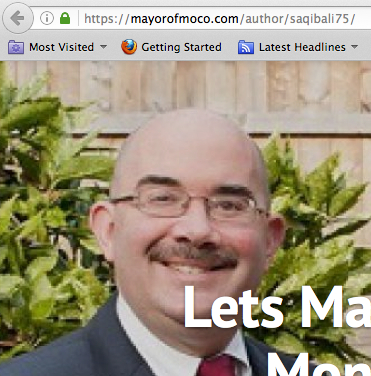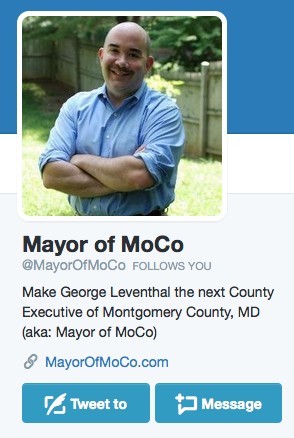 Not too long ago, a web page popped up touting County Councilmember George Leventhal (D-At Large) as the next “Mayor” (i.e. County Executive) of Montgomery County. George is widely known to be interested in the race – he ran last time but withdrew before the primary to run for reelection.
Not too long ago, a web page popped up touting County Councilmember George Leventhal (D-At Large) as the next “Mayor” (i.e. County Executive) of Montgomery County. George is widely known to be interested in the race – he ran last time but withdrew before the primary to run for reelection.
The webpage is funny and gives a list of ten reasons – some serious, some joking – why Leventhal should be the next Exec. The author is seemingly the anonymous “Mayor of Moco:”
 Clicking on the author’s name reveals inadvertently that former Del. Saqib Ali (D-39) is the author. While his name is not mentioned anywhere on the connecting page, it shows up in the URL:
Clicking on the author’s name reveals inadvertently that former Del. Saqib Ali (D-39) is the author. While his name is not mentioned anywhere on the connecting page, it shows up in the URL:

In addition to creating the web page, Saqib has created an anonymous twitter account:
 Saqib Ali has been very active in MoCo politics. He won election to the House of Delegates on a slate from District 39 in 2006. When the Senate seat became vacant, he sought it but the Montgomery County Democratic Central Committee selected the much more experienced Del. Nancy King for the vacancy.
Saqib Ali has been very active in MoCo politics. He won election to the House of Delegates on a slate from District 39 in 2006. When the Senate seat became vacant, he sought it but the Montgomery County Democratic Central Committee selected the much more experienced Del. Nancy King for the vacancy.
Del. Ali spent most of the next four years of his term in the House openly preparing to challenge King for the Senate seat. Indeed, the 2010 Senate primary was exceedingly close but King prevailed over Sleepy Saqib – as Sen. King labelled him during the campaign – by a margin of 3.4%.
In 2012, Saqib made a much less successful run for a Board of Education seat. In 2014, he announced but then pulled back for a run for a seat in the House of Delegates. Since then, he has become known for his activism in support of the BDS Movement, which advocates for boycotts, divestment and sanctions of Israel.
At the Montgomery Priorities Hearing, Saqib testified against legislation advocated by Del. Ben Kramer that would have resulted in the State boycotting companies and institutions that boycott Israel. More recently, he testified as a member of the Steering Committee of Marylanders for BDS on legislation before George’s committee on the Council on County legislation.
During his testimony, Saqib stated that Israeli settlements are “quite close to a war crime.” He then drops the qualifier when he says that “settlements meet the Geneva Convention definition for ‘war crime.” In short, he is now a strong and public advocate for BDS.
George Leventhal’s Viewpoint
George Leventhal kindly replied to my questions regarding the web page and BDS via email. Regarding the web page, George told me:
Saqib is a longtime friend. He let me know that he was planning to express his enthusiasm online about my potential candidacy for County Executive, but the “Mayor of MoCo” initiative is his alone, and I have had no involvement in it.
If I decide to run for County Executive, I will welcome Saqib’s involvement and will hope to win the support of a wide range of county residents, but I am a long way from making any decisions regarding 2018. In my four successful election campaigns, I am honored to have had the support of many activists in both the Jewish and Muslim communities, as well as many other communities. As an at-large councilmember who has represented more than one million constituents for nearly 14 years, I would not expect to agree with every opinion of every one of my supporters.
George’s point about not agreeing with everyone of his supporters is a good one. Who does? However, Saqib is not some random supporter among many. Saqib and George may well have become closer allies over George’s support for efforts to incorporate a Muslim holiday into the school calendar – a positive effort that is about recognition and inclusion. But George’s “longtime friend” is also leading local activist in support of BDS who is a former state legislator and has testified at least twice on the issue. At the very least, George raised no objection to this page, which represents his first public move for a bid for County Executive. As a result, pro-BDS Saqib seems more than some minor supporter.
George also shared his views on the BDS Movement:
I do not associate myself with efforts to boycott Israel or divest from it or impose sanctions on it. I feel a deep affinity for Israel, which I have visited three times. My sister lived there for several years. I support a two-state solution. In general, I would describe my views on the Israel/Palestine issue as consistent with those of J Street.
I would not characterize Israeli settlements in the West Bank as a war crime, although I think they are extremely counterproductive to the goal of peace in the Middle East.
While many might disagree with George’s views on BDS or Israeli settlements as either too liberal or too conservative, I’d say they fall right in the mainstream of Jewish and American opinion.
Some might argue that Donna Edwards’s identification with liberal J Street did her some harm in the Democratic primary, and that the same fate could befall George. More hardline pro-Israel voters do indeed reject J Street. Many others, however, would find George’s viewpoints utterly reasonable.
The more serious political problem is when a candidate is perceived fundamentally unsympathetic to Israel. In George’s comments, that is clearly not the case, as he strikes a smart balance of “deep affinity for Israel” and support for a “two-state solution.” But linkage with a prominent BDS supporter in what is essentially his prospective campaign’s first outing undermines that perception.
Moreover, Saqib is working to make this linkage stronger. He has now become the first person to attack me on Twitter before I even drafted a piece. Expressing anger at my “smears” and “appalling tactics,” Saqib then turned to faux outrage that I won’t open up this space to him. I look forward to all the pro-BDS webpages opening up their space to AIPAC and J Street.
All of this is helpful to getting Saqib Ali more attention but it sure doesn’t help George Leventhal.
Foreign Policy in County Elections?
Normally, I would not think foreign policy terribly relevant to a campaign for county executive. Aside from the nice Sister Cities program, my hope would be that any county executive focus on the nuts and bolts of making the County work well. But Saqib’s repeated public interventions show how views on the Israeli-Palestinian conflict can become intertwined with even local politics.
The injection of a prominent BDS supporter as part of George’s effort to stick his political toe publicly in the water will likely raise concerns among the many voters who oppose BDS and does not help us keep focused on the issues that matter – the ones on which George Leventhal has spent the vast majority of his career and has exhibited a great deal of genuine passion for over the years.
 Today, we take a peek at the two most vulnerable Republicans in the House of Delegates. Parts I and II in this series already outlined the safe Democratic and safe Republican seats.
Today, we take a peek at the two most vulnerable Republicans in the House of Delegates. Parts I and II in this series already outlined the safe Democratic and safe Republican seats.



